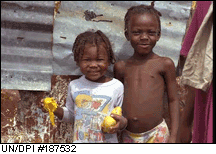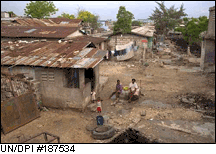|
|
The Brandt Proposals: A Report Card
Poverty
|
|
The underlying cause of hunger is poverty. In 1980, there were 800 million people surviving on the margins of society, struggling for bare necessities. The Brandt Reports called for prompt and urgent action for the poorest nations. The Brandt Commission proposed an international action program to provide for adequate housing, health and medical care, eradication of disease, increased availability of credit, support of industrialization, transportation, infrastructure, solar energy development, water and soil management, reforestation projects, land and mineral development, employment for the landless, and land reform. In addition, the Brandt Reports called for a massive 'transfer of resources' to poor nations, including food, aid, energy, and technology. |
| |
"Few people in the North have any detailed conception of the extent of poverty in the Third World or the forms that it takes. Many hundreds of millions of people in the poorer countries are preoccupied solely with survival and elementary needs. For them work is frequently not available or, when it is, pay is very low and conditions often barely tolerable. Homes are constructed of impermanent materials and have neither piped water nor sanitation. Electricity is a luxury. Health services are thinly spread and in rural areas only rarely within walking distance. Primary schools, where they exist, may be free and not too far away, but children are needed for work and cannot easily be spared for schooling" (N-S, 49). …"Health care, social development and economic progress must advance interdependently if we are to attain our objectives for the year 2000" (N-S, 16).
|
In these two decades, poverty has more than doubled. One billion people are uneducated. One billion lack safe shelter. Nearly three billion lack adequate sanitation. In all, 1.8 billion people now live in absolute poverty – according to the UN Development Program's standard of minimum human requirements. Despite an overall increase in political freedom around the world, the international community has not embraced the human rights of poor people in any meaningful way. |
|
 |
|
|
The actual cost for eliminating world poverty is far lower than most people realize. In the late 1990s, the UNDP projected some of the annual expenses of a global anti-poverty program, including $9 billion for water and sanitation, $6 billion for education, and $13 billion for health and nutrition. According to other estimates from the World Bank, the price tag on a comprehensive international relief package would be about $80 billion a year – about 10% of the world's annual military budget.
Strange to say, the satisfaction of need is not a basic entitlement for the legions of humanity. Many governments, non-governmental organizations, public relief agencies – and, above all, various United Nations agencies – are making significant contributions. Still, there is no systematic effort to eliminate global poverty. Terms for local employment in developing nations are set, in large part, by foreign corporations. While infrastructure has been improved in some areas, poor people remain without basic necessities, suitable health or working conditions, fair wages, or adequate purchasing power. They have also fallen far behind in medical research, communications, and information technology.
A Basic Development Model
• Food brings satisfaction
• Housing brings stability
• Health brings security
• Education brings opportunity
• Income brings sustained development
Emergency programs for food, housing, healthcare, and education are urgently needed. Red tape must be cut to ensure that resources reach impoverished people directly, unfiltered through bureaucracy or corrupt governments.
|
| |
 |
|
A reformed World Bank, along with the World Health Organization and other UN agencies, ought to have authority to coordinate a massive international relief program. This could be augmented by national projects, overseen by a council of representatives from developed and developing nations. |
| |
Instead of fighting wars, armies and navies from the developed world could be deployed to bring in the food, resources, and technology needed to help poor nations reverse hunger and poverty, and build new social and economic infrastructure. The developing world could be totally transformed in a few years were developed nations to take the initiative.
Instead of eradicating poverty, world policies have contributed to it. In every society where it exists, mass poverty results in population growth, environmental stress, family breakdown, increased migration, repression of human rights, coups, civil war, and other forms of state collapse. Living on the edge of subsistence, unable to improve their physical condition, the self-fulfillment and creativity of millions of people is suppressed and nullified. The loss to the world in personal earning power and productive capacity is incalculable. Poverty is an affront to human dignity, destabilizing for everyone. In a proudly civilized global society, an era of marvelous opportunity for so many, this waste of human potential is degrading to every living person, rich and poor. |
| |
| GRADE: F |
| |
|
|
|
|
|
|
|
|

